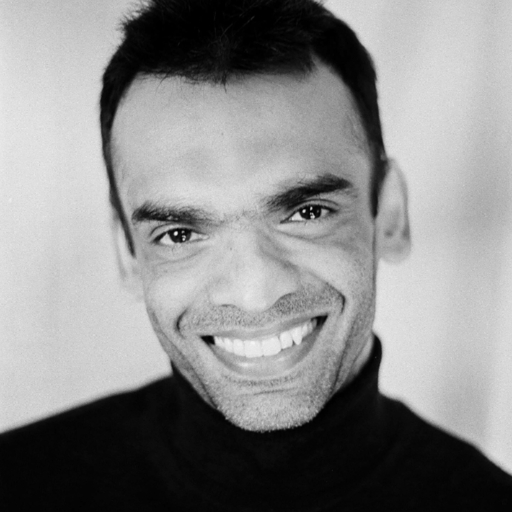Need a loan? In Ghana, neighbours are helping neighbours
Why It Matters
In Ghana's rural communities, Village Savings and Loan Associations are powerful, neighbour-to-neighbour systems that offer crucial access to credit and foster economic resilience. Community-based finance solutions could lift countless people out of poverty.
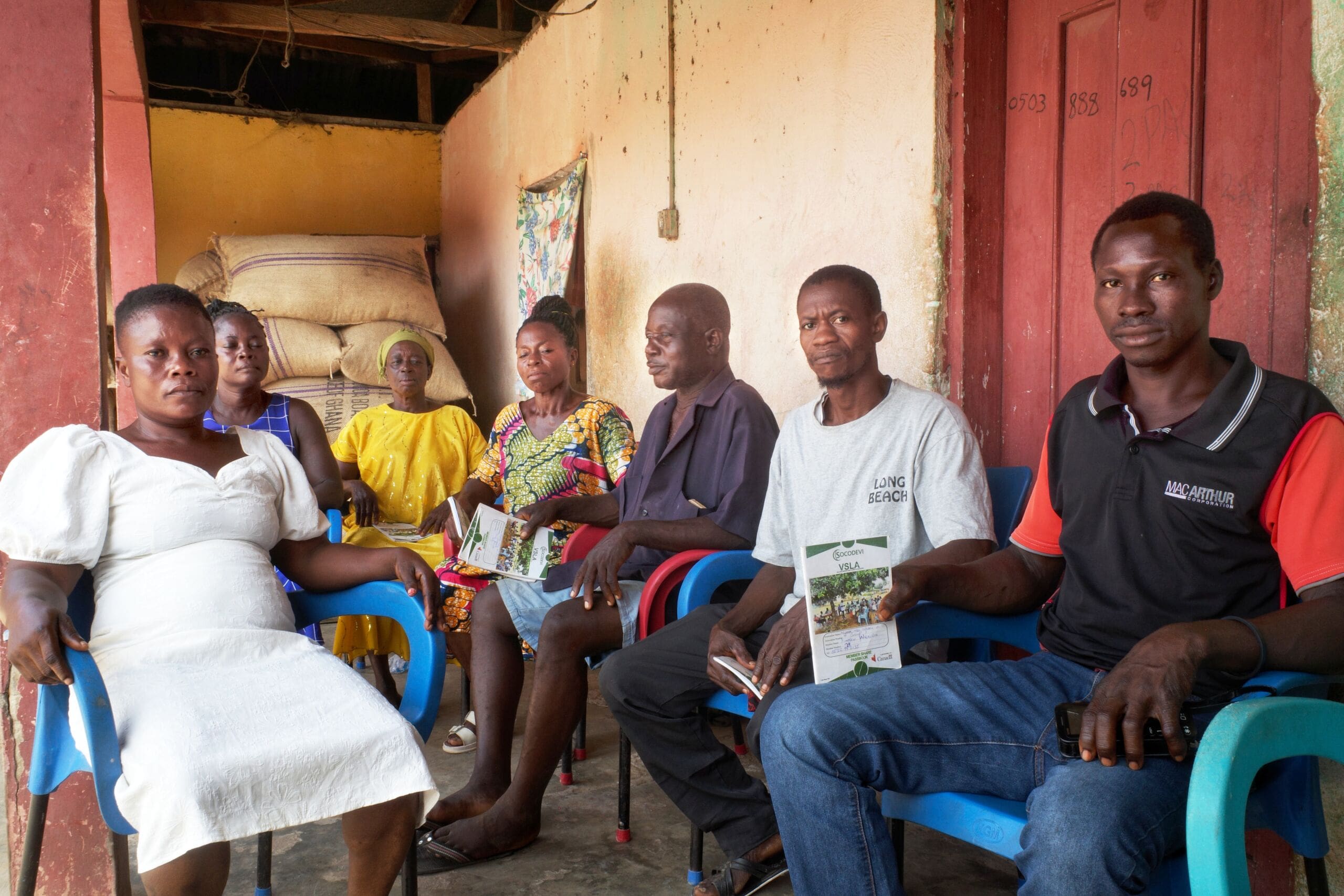
In a small Ghanaian village just a few hours’ drive from the city of Kumasi, cacao farmers of all ages and genders gather in a courtyard, waiting to collect money from a grey metal cash box sitting on a wooden table draped in white cloth.
Behind the table sit members of their Village Savings and Loan Association (VSLA).
“The VSLA has helped me because I saved money and got a loan to improve my business. We’ve got a school in the community, and I sell food there. I sell garri [porridge] and beans. I also make Indomie,” a woman named Janet said through a translator while speaking Twi, a language common to eight million Ghanaians.
The farmers gathered in the courtyard have made regular financial contributions to the VSLA and are now collecting their investments.
Despite being the world’s second-largest producer of cacao, 90 per cent of Ghana’s cacao farmers earn less than a living wage (estimated to be around 15,000 Ghanaian Cedis, or $1,400, per year), and many live on less than $2 USD per day.
Most Ghanaian cacao farmers are small-scale producers, owning between three and five acres of land. Due to low, inconsistent income and a lack of collateral, they struggle to obtain bank loans.
The community-managed financial associations allow those outside the formal credit system to save and borrow money.

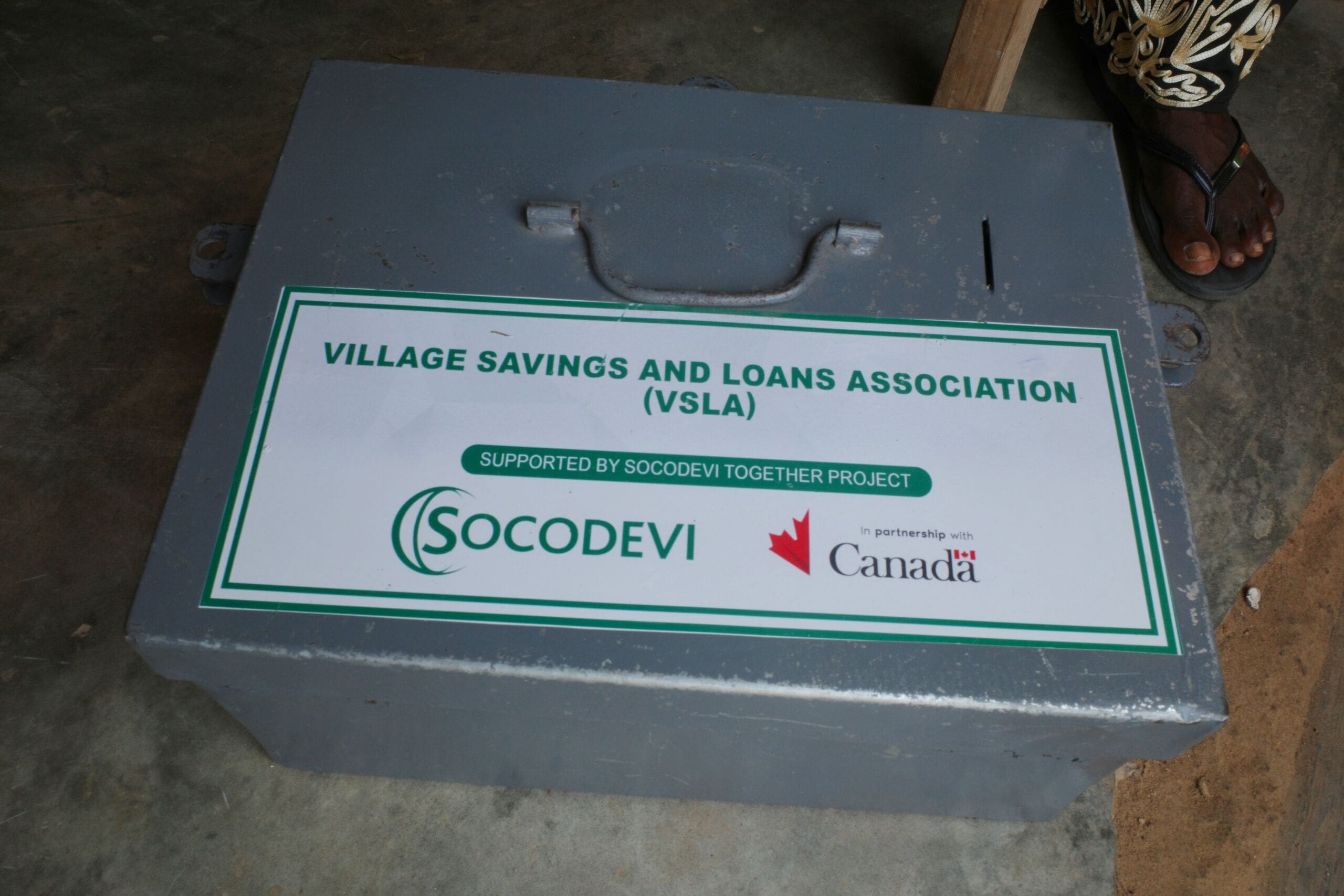
On the cash-out day in Adansi, members saved and earned between 1,000 and 3,000 Cedis, a considerable amount generally unavailable to them through other means.
Farmers typically invest the yearly returns and credit in revenue-generating activities such as agriculture, small businesses, and education.
VSLAs were introduced in Ghana in the early 1990s by Plan International, following success in Niger a decade earlier. More than 34,000 VSLAs exist in Ghana, with over 850,000 members, and $20 million in savings.
Given its role in mobilizing grassroots-level finances and strengthening social protection, Quebec-based Société de coopération pour le développement international (SOCODEVI) embarked on a five-year project worth $10 million in 2022 to support 150 cacao cooperatives in Ghana and build their financial capacity by setting up VSLAs.
Funding for the project, called TogetHER, was provided by Global Affairs Canada.
Inside the VSLA model
“It’s a self-selected group, typically between 15 and 30 members. These individuals know each other and can determine who would be a reliable member,” said Theophilus Nkansah, the project’s regional director for the Ashanti region.
“They can collectively decide not to admit someone they believe might cause problems for the group,” he added.
Groups meet weekly, and a financial cycle lasts one year. Every meeting consists of two key activities.
First, each member contributes to the social fund. The group decides the contribution amount. For the group in Adansi, the amount was one Ghanaian Cedi.
Rita Addai, organizational and enterprise development facilitator at SOCODEVI, explained that the social fund has two primary purposes. Members can obtain small loans of a few hundred Cedis for unforeseen expenses, such as funerals. The money must be paid back within two weeks, and the loans may or may not come with interest.
“As the social fund grows, the group may decide to invest in ventures that can generate additional income for the members,” Nkansah said.
After contributing to the social fund, members must purchase shares, at least one and a maximum of five per week. The group decides the value of each share based on its financial capacity. In Adansi, the price was 10 Cedis per share.
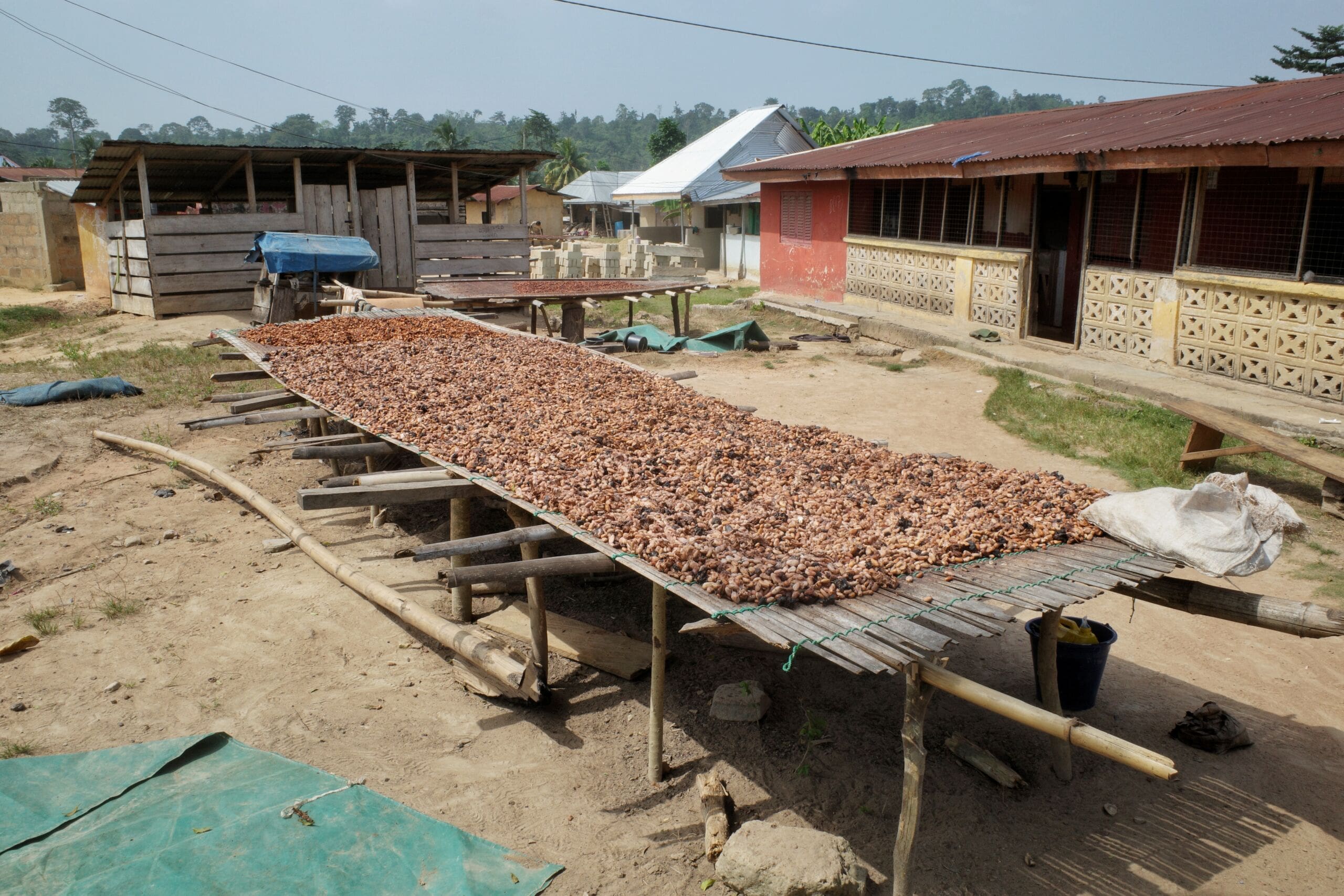
As the savings grow, the money is loaned out to members who require it. Unlike loans from social funds, they are larger in amount, given once a month, and have to be paid back in three months with interest. The group determines the level of interest. All the groups involved in SOCODEVI’s project have a set rate of 5 per cent.
“Any member is eligible to apply for a loan from their VSLA,” said Addai, with the condition that the loan amount does not exceed three times their total savings contribution.
She explained that a member’s saving capacity and the loan’s intended use are evaluated during the application process. An application may be rejected if the loan’s use isn’t for a revenue-generating activity. A guarantor is required for all loans.
The interest and the principal are reinvested into the savings, along with other monies raised through fines for violations. For instance, arriving late or skipping a meeting might incur a fine of one Cedi. Even too much chit-chat during a meeting can result in a fine.
“The group collectively decides which actions will attract a penalty,” Addai said.
Nkansah added that all the money is kept in a secure metal box with three padlocks. The individual holding the box does not have the keys; three separate keys are entrusted to three non-executive members.
The box is kept in the home of a member who does not have a key and is opened only at weekly meetings.
The cashout occurs at the end of the financial cycle. Each member gets back the money they invested plus a proportional share of the profits earned from loans and fines.
The social fund, which is carried over to the next year, builds safety and allows for collective investment.
Overcoming obstacles
While the villagers have embraced VSLAS, there was a steep learning curve, and some challenges remain.
“It’s not easy to go to a community and talk about the VSLA—something they don’t know anything about—and then expect them to agree quickly,” Nkansah said.
“Sometimes, when you go to those areas, because of your level of literacy and education, the first reaction is that they don’t trust you,” he added.
The mistrust is deep-seated.
“In Ghana, there was a time when many communities had negative experiences with financial institutions. A lot of people were defrauded,” Nkansah said.
The key to winning villagers’ trust has been keeping the cash in the community.
“We emphasize that we don’t handle their money. We stress, ‘You are not giving the money to us. The money stays with you. Your record-keeping is in your hands.’ We only provide training on how to manage these things,” he said.
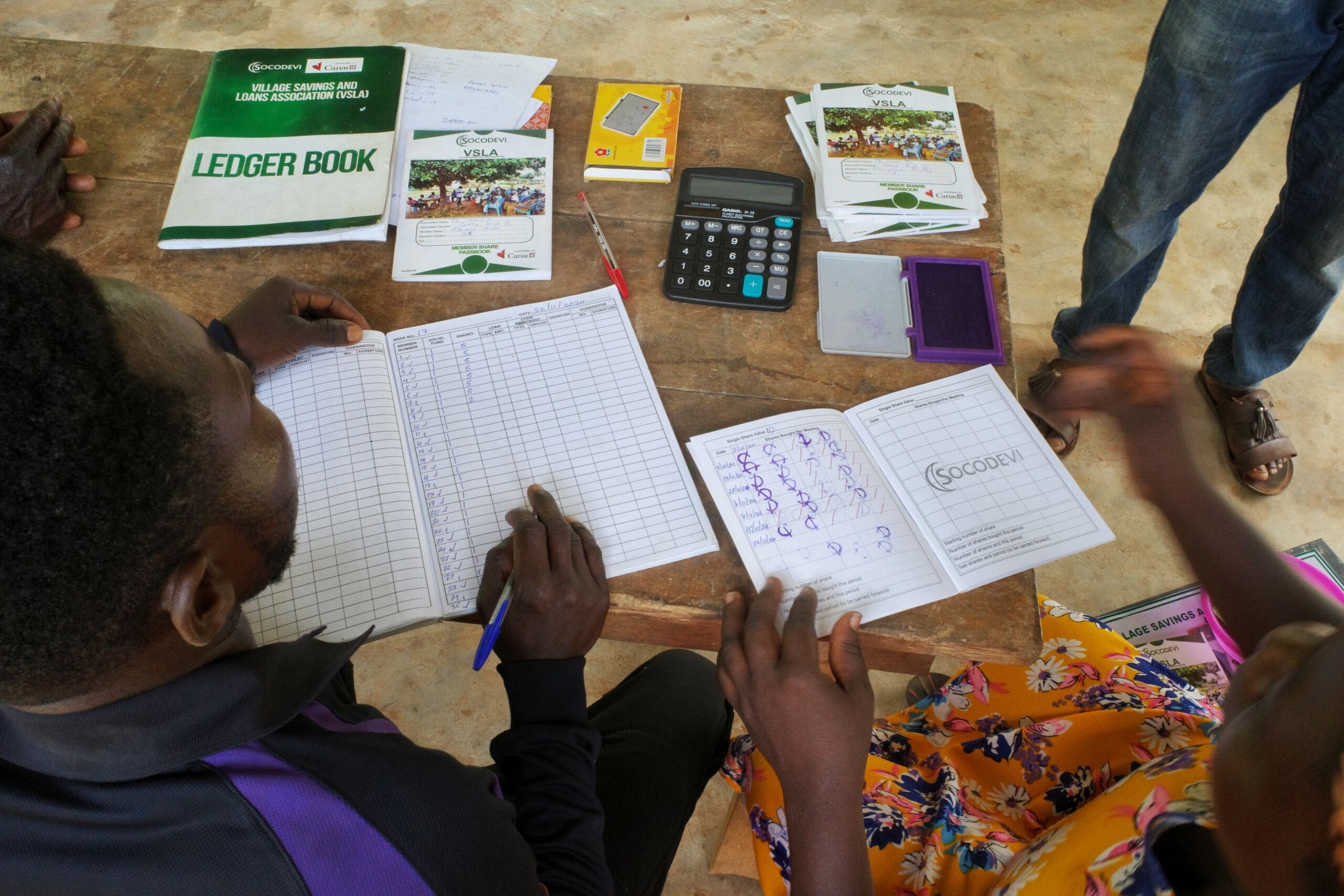
While physical cash offers a sense of security, it creates insecurity in other ways.
Nkansah noted several instances where armed robbers stole the cash box.
To overcome the problem, villagers were encouraged to open a bank account.
“We advise them to choose a bank they trust. We don’t direct them to a specific bank where we might have an interest. Instead, we say, ‘Choose a bank that you know and trust, and one that isn’t too far away,’” Nkansah said.
“We recommend having three signatories for the account. They can request bank statements periodically. When they receive a statement showing, for example, 2000 Cedis, they can compare it to their ledger book,” he added.
Loan defaults are another challenge, leading to a cash shortage for payouts. A guarantor system was introduced to address this issue. If a member wants to take a loan, they must have a guarantor who is also a member.
“The group uses the borrower’s savings to cover the outstanding amount in case of a default,” Addai said. “If there’s still a balance after the share-out, the guarantor’s savings will be used. The group’s executive members will then work to ensure the guarantor is reimbursed.”
A contribution limit was also introduced to prevent defaults, capping the borrowed amount at three times a member’s contributions.
“These were some of the issues I observed in the past. So, to prevent these challenges in the new groups we are forming, we’ve put specific measures in place,” Nkansah said.
Thinking bigger
There are ways to potentially upscale VSLAs. According to Nkansah, one way would be to withdraw only half the savings at the end of the year and invest the remaining in a collective venture to raise more revenue.
Another avenue would be for several VSLAs to merge and form a credit union, he said.
“They would pool their funds, enabling them to provide larger loans to their members and at higher interest rates to non-members. The key requirement here is having the capacity to manage such an organization effectively.”
More than just money
Without a financial setup such as a VSLA, farmers would have to borrow money from individual lenders at exorbitant rates, often with their farmland as collateral, which the lender would confiscate in case of default.
VSLAs fill the void and instill financial discipline among the members. For Addai, they add a sense of empowerment.
Addai explains that people often expect external help in the absence of empowering mechanisms.
“There is a saying that if you are going to church to pray to God and you encounter a white man, you should just stop going to church because you feel you have already seen the answer,” she said.
Women, the marginalized among the marginalized, appreciate the benefits of VSLAs.
In Adansi, Janet said that VSLAs have helped women “gain confidence and become bold in whatever we do. Women should not rely on their husbands all the time. Now, I can save, and all the women around can also say they’ve been able to save. We have the confidence that we can also support our house financially.”

